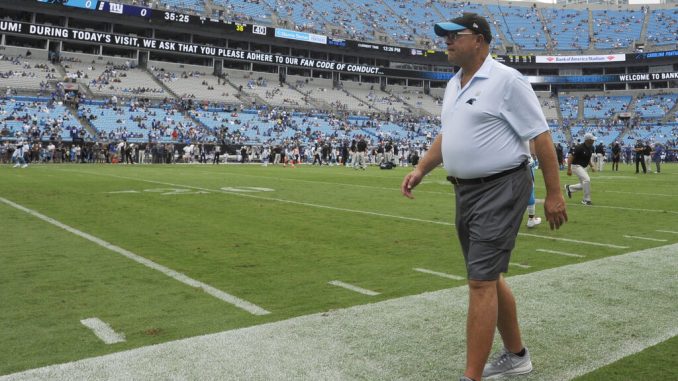
CHARLOTTE — Panthers owner David Tepper expressed frustration with government officials over not allowing fans in the stadium for the team’s Sept. 13 home opener against the Las Vegas Raiders.
Tepper said he’ll continue to have conversations with government officials, including North Carolina Gov. Roy Cooper, about allowing the team to bring in a limited number of fans into Bank of America Stadium for future home games this season.
As of now, North Carolina is operating at Phase 2.5 of its COVID-19 recovery plan, which still prohibits mass gatherings or more than 50 people.
“We started developing a plan in March based on science and we spent a lot of time on it,” Tepper said during a conference call Wednesday of the team’s preparation to host fans at games.
“We have infectious disease experts in the plan, computer simulations, the whole bit, trying to be as safe as we can be. We do think we can do this. We don’t think we can do this as a whole stadium obviously, but we think we can do limited fans in the stadium very safely based on pure science.”
Tepper said more than half of the team’s permanent seat license holders have expressed a willingness to attend games this season despite the ongoing pandemic.
Tepper is concerned that Carolina’s division rivals in Atlanta, Tampa and New Orleans will have fans in their stadiums at some point this season, while the Panthers might not, thus creating a “competitive disadvantage.”
As of now, the Buccaneers and Falcons will not have fans at their first two home games. The Saints will have no fans at their first home game. But Tepper is worried Georgia and Louisiana state officials will allow NFL fans to attend games before North Carolina officials do.
“It’s just a question of how the different regions are and how they view it, and what the different governors view and such — and maybe how much they like football or not,” Tepper said with a laugh.
Among the other topics Tepper addressed in a wide-ranging 25-minute interview:
• The Panthers owner said any decisions regarding a new downtown Charlotte stadium have been pushed back because of the pandemic. He had previously talked about building a stadium with some type of roof in the next “five to 10 years” that could host other major sporting events, including a Final Four, but said in light of the pandemic “open-air stadiums with beautiful weather seem a lot better to me today than they did last year, to tell you the truth.”
• He said construction of the team’s massive new headquarters across the border in Rock Hill, South Carolina, has been delayed by COVID-19. He said it will likely not open until the 2023 training camp. It was originally scheduled to be ready in time for training camp in 2022.
• The statue of former Panthers owner Jerry Richardson will not be returning, Tepper said. He had the statue removed from outside the stadium earlier this year for “safety reasons” because other statues around the country were being torn down amid protests over racial injustice. Richardson sold the team to Tepper after allegations of sexual and racial misconduct in the workplace.
• Tepper also discussed the fans’ reaction to the decision to release longtime quarterback Cam Newton earlier this year by saying, “I didn’t know so many people in Charlotte knew a word that began with F.” Tepper said the uncertainty surrounding Newton’s lingering injuries and the team’s inability to monitor those because of the coronavirus pandemic put the team in a “very difficult position at his ($19.3 million) salary, quite frankly.”
• Tepper said he hasn’t spoken to general manager Marty Hurney about his future, adding that the focus has been on getting the Panthers ready for the season. Hurney’s contract runs through June 2021.



